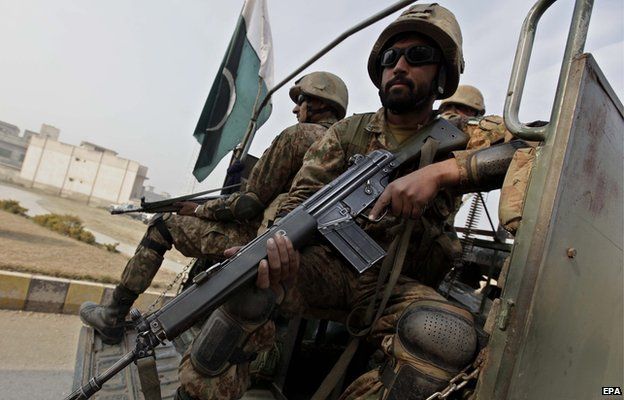Pakistani Taliban: Army kills '59 militants'
- Published

Pakistan's military says it has killed 59 militants in ground assaults and air strikes on Taliban units in areas near the border with Afghanistan.
The operations come days after the Taliban killed 141 people at a school in Peshawar, mostly children.
The military has stepped up its offensive against the insurgents in the provinces of the Khyber agency and North Waziristan.
Assaults on militants in North Waziristan began in June.
This week's operations included a series of ground assaults and 20 air strikes by Pakistani jets in the Khyber tribal region, which killed 27 militants including an Uzbek commander.
An ambush on Thursday night by special forces in the Tirah Valley, an area near the Afghan border, killed another 32 militants.
'Break their backs'
Pakistani Defence Minister Khawaja Asif told the BBC that his country ought to have pursued military action against the Taliban earlier this year, instead of holding talks with the militants.
"A negotiated settlement with these people is not possible," he said.
"There has to be a military solution, we have to eliminate them first, we have to break their backs," he said. "Total elimination is what the people of Pakistan want."
The government initiated peace talks with the Pakistani Taliban earlier this year, but the negotiations made little headway.
Attempts at a peace process ended following a Taliban attack on the country's busiest airport in Karachi in June. The attack left at least 38 dead, including the attackers.
In response, the army began a new offensive against the Taliban. It says its offensive has killed more than 1,700 militants.
However, restricted access to many of the conflict zones means that the numbers are difficult to independently verify.
Efforts to stamp out insurgent networks have focused on the North Waziristan agency on the border with Afghanistan.
The region is a stronghold of the Pakistani Taliban (TTP) as well as the Haqqani Network - a Pakistan-based militant group with links to both the Taliban and al-Qaeda.
The city of Peshawar, close to the Afghan border, has seen some of the worst violence during the Taliban insurgency in recent years, culminating in Tuesday's attack on the army-run school.
The massacre at the Public Army School prompted outrage around the world.
The Taliban said that the attack was an act of revenge for its own losses in the army's military offensive.
Political violence
The BBC tracked fatal global jihadist attacks across the month of November 2014 and a total of 13 were carried out in the Khyber Pakhtunkhwa province, where Peshawar is located.
Of all the 35 attacks in Pakistan in November, 32 were carried out by the TTP or Taliban. It killed 143 people.
It is estimated that as many as 50,000 Pakistanis have been killed in political violence since 2001.
Members of the security forces, including both the army and the police, account for around 10,000 of those deaths.
Who are the Pakistani Taliban?
•With its roots in the Afghan Taliban, the Pakistani Tehreek-e-Taliban (TTP) movement came to the fore in 2007 by unleashing a wave of violence
•Its leaders have traditionally been based in Pakistan's tribal areas but it is really a loose affiliation of militant groups, some based in areas like Punjab and even Karachi
•The various Taliban groups have different attitudes to talks with the government - some analysts say this has led to divisions in the movement
•Collectively they are responsible for the deaths of thousands of Pakistanis and have also co-ordinated assaults on numerous security targets
•Two former TTP leaders, Baitullah Mehsud and Hakimullah Mehsud, as well as many senior commanders have been killed in US drone strikes